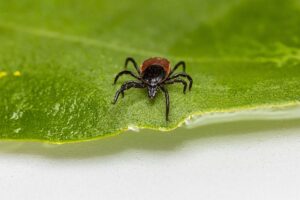As the weather warms up in New Hampshire and across the Northeast, people and pets begin spending more time outdoors. Unfortunately, so do ticks. These tiny, disease-carrying pests are more than just a nuisance—they pose serious health risks to both humans and animals.
In this article, we’ll cover the basics of tick awareness, highlight the most common tick species in the Northeast, and share practical tips to protect your yard, your family, and your pets from unwanted encounters.
Ticks Species in the Northeast
 There are several species of ticks found in our region, but a few are especially important to know:
There are several species of ticks found in our region, but a few are especially important to know:
- Blacklegged Tick (Deer Tick): The most notorious tick in the Northeast, known for transmitting Lyme disease, anaplasmosis, and babesiosis.
- American Dog Tick: Common in grassy areas, this species can carry Rocky Mountain spotted fever and tularemia.
- Lone Star Tick: While more prevalent in the South, this tick is expanding northward. It can transmit ehrlichiosis and has been linked to red meat allergies in some cases.
- Brown Dog Tick: Known for infesting homes and kennels, this species prefers dogs and can spread various diseases to them.
Understanding which ticks are active in your area helps you take the right preventative steps at the right time.
Why Tick Prevention Matters
Ticks are more than just gross. They’re dangerous. A single bite from an infected tick can lead to weeks, months, or even years of chronic illness if not caught early. Children, older adults, and pets are especially vulnerable.
Lyme disease, which is most commonly spread by blacklegged ticks in the Northeast, affects thousands of people every year. Early symptoms include fatigue, fever, joint pain, and the characteristic bull’s-eye rash—but not everyone develops these signs. That’s why prevention is key.
Reducing Ticks in Your Yard
Your yard is the first line of defense in reducing tick populations and avoiding bites. Here’s how to make your outdoor space less inviting to ticks:
- Keep Grass Cut Short
Ticks love tall grass and dense brush. Mow your lawn regularly and trim back weeds, tall grasses, and overgrown shrubs.
- Create a Barrier

Use mulch or gravel to create a 3-foot wide barrier between your lawn and any wooded or brushy areas. This makes it harder for ticks to migrate into commonly used spaces.
- Remove Leaf Litter and Debris
Ticks hide in piles of leaves, wood, and clutter. Clean up yard waste promptly and keep firewood stacked neatly and off the ground.
- Discourage Wildlife Visitors
Deer, mice, and other small animals are common tick hosts. Install fencing to keep deer out, and use rodent-proof storage for birdseed and pet food.
- Choose Tick-Resistant Landscaping
Consider using gravel, wood chips, or hardscaping features instead of dense ground covers like pachysandra, which can harbor ticks.
Protecting Your Pets
 Pets are prime targets for ticks—and they can bring those pests into your home. Here’s how to help protect your furry family members:
Pets are prime targets for ticks—and they can bring those pests into your home. Here’s how to help protect your furry family members:
- Use veterinarian-approved tick preventatives year-round.
- Check your pets daily after they spend time outdoors, especially under their collar, around their ears, and between their toes.
- Keep pets out of wooded and overgrown areas when possible.
- Maintain a tick-free yard so they can safely roam and play.
Personal Protection Tips
Even with a well-maintained yard, it’s smart to take precautions whenever you’re spending time outdoors:
- Wear light-colored clothing to spot ticks more easily.
- Tuck pants into socks and shirts into pants when walking through tall grass or wooded areas.
- Use EPA-registered insect repellents that are effective against ticks.
- Perform full-body tick checks after being outside—especially on children and pets.
- Shower within two hours of coming indoors to help wash away ticks before they bite.
Call in the Professionals
While DIY efforts can help, professional tick control is the most reliable way to reduce tick populations around your home. At Cornerstone Pest Control, we offer comprehensive, seasonal tick treatments that target the areas where ticks live and breed—helping to protect your yard, your family, and your pets.
Don’t wait until you find a tick—take action now. Contact Cornerstone Pest Control today to schedule your tick prevention service and enjoy a safer, more comfortable outdoor space this season.
